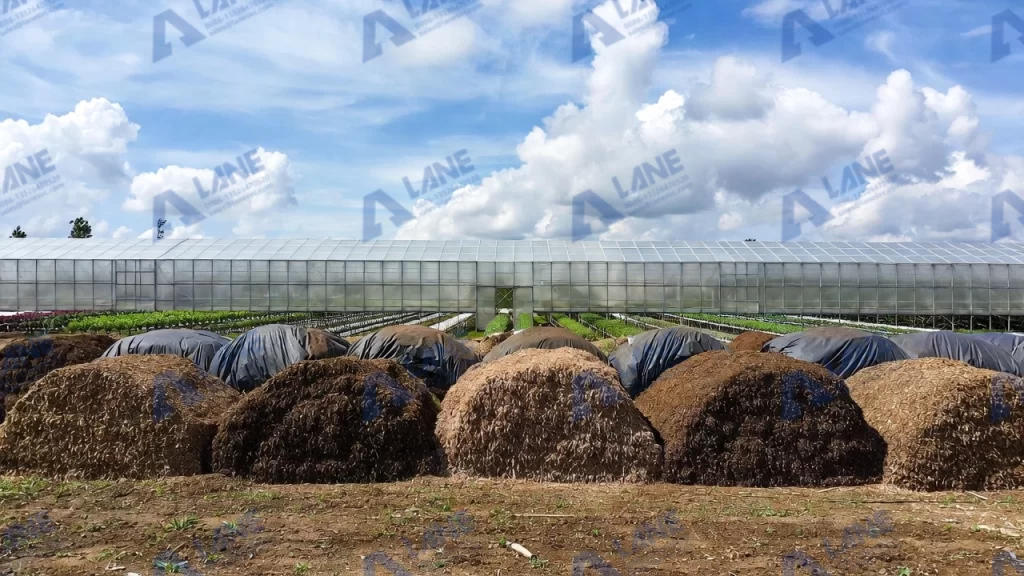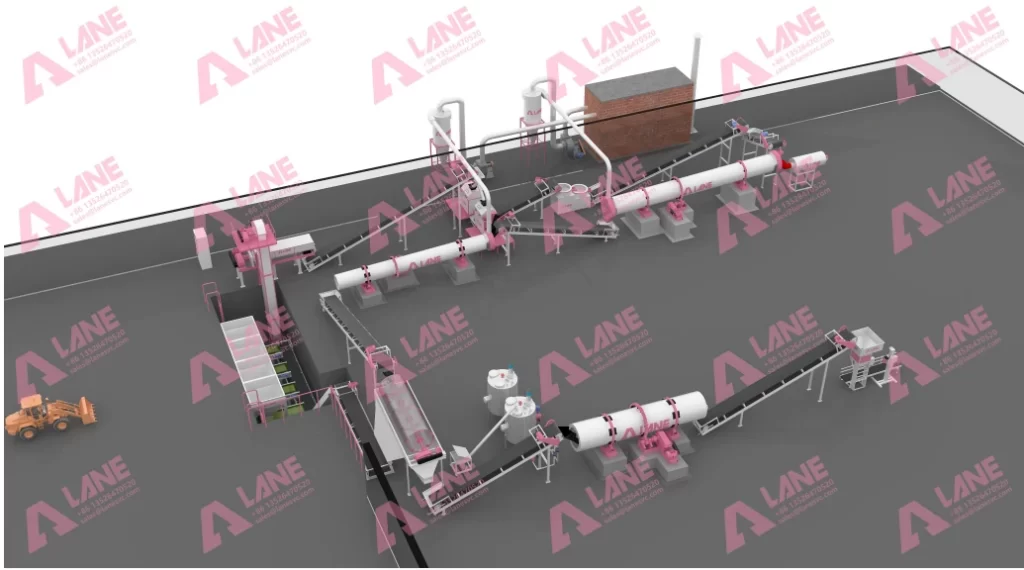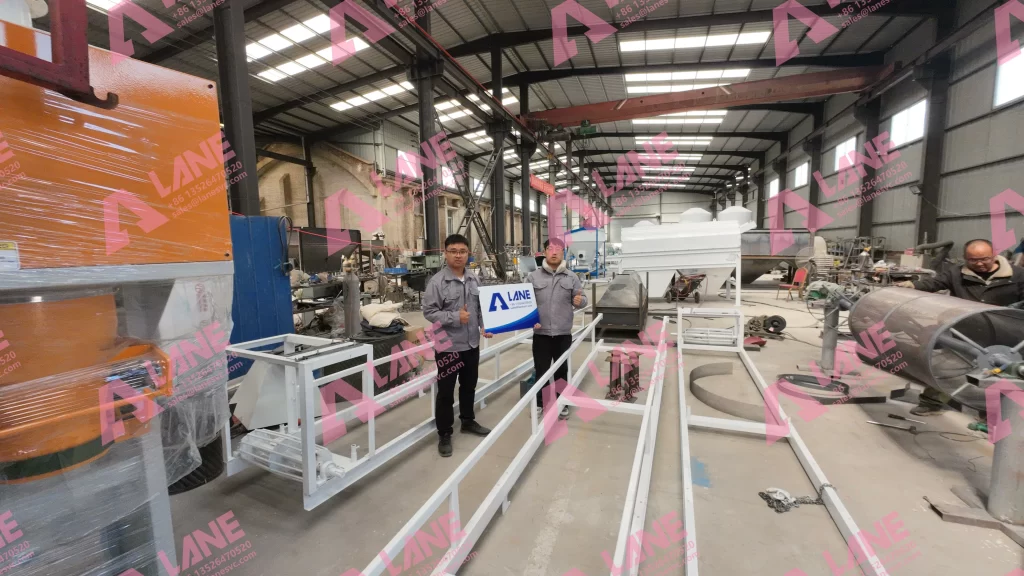In modern agriculture, sustainable farming practices are no longer a luxury but a necessity. The turner used for organic fertilizer production plays a crucial role in converting raw organic waste into high-quality organic fertilizer. Whether it is livestock manure, crop residues or other biodegradable materials, an efficient turner can ensure good aeration, moisture control and microbial activity during the composting process.
For farmers, cooperatives and agricultural enterprises that hope to maximize output while reducing costs, investing in a reliable organic fertilizer production turning machine is one of the wisest decisions you can make.
Why Compost Turner Machines Matter for Organic Fertilizer Production
With the continuous enhancement of global environmental protection and soil health awareness, organic fertilizers are becoming more favored than chemical fertilizers. The demand for organic fertilizers is growing rapidly, especially in regions such as Europe, North America, and Southeast Asia. Efficient composting processes are fundamental to producing high-quality organic fertilizer, and this is where the compost turner machine for organic fertilizer production plays an indispensable role.

By automating the turning and aeration of the organic waste pile, these machines can accelerate microbial activity, ensure uniform decomposition, and maintain optimal humidity and temperature levels. This mechanization not only shortens the composting cycle but also enhances the nutritional content of the final product, making organic fertilizers more effective and more commercially valuable.
How a Compost Turner Machine Fits into the Organic Fertilizer Production Process
The journey from raw organic materials to nutrient-rich fertilizer involves several stages, with compost turning as a central step:
Raw Material Preparation: Organic waste such as animal manure, crop residues, and kitchen waste is collected and sometimes pre-crushed to uniform sizes.
Composting Initiation: The prepared raw materials are heaped into windrows or piles.
Composting with a Compost Turner Machine: The compost turner machine for organic fertilizer production systematically overturns these piles, incorporating air and redistributing moisture.
Equipment such as the hydraulic crawler type compost turner or groove type compost turner are often employed depending on the scale and terrain.
Temperature and Moisture Monitoring: During turning, sensors may be used to track key parameters to ensure ideal microbial conditions.
Screening and Crushing: After sufficient decomposition, compost is screened and crushed to remove contaminants and achieve desired particle size.
Pelletizing (Optional): The compost may then be granulated using a pelletizer if pelletized organic fertilizer is desired.
Packaging and Distribution: Finally, the fertilizer is packaged for sale or direct use.
LANE’s equipment lineup integrates perfectly into these stages, ensuring smooth workflow and optimal output quality.
Types of Compost Turner Machines for Organic Fertilizer Production
Selecting the right compost turner depends on production scale, material type, and site conditions. Below are common types:
| Type | Features | Suitable For | Advantages |
| Crawler Type Compost Turner | Equipped with tracks, moves easily on rough terrain | Large farms, uneven surfaces | Strong traction, high efficiency |
| Groove Type Compost Turner | Works in fixed grooves for compact composting | Medium to large production lines | Space-saving, consistent turning |
| Wheeled Compost Turner | Mounted on wheels, flexible operation | Smaller farms, flat terrain | Mobility, lower initial investment |
| Remote Control Crawler Compost Turner | Automated equipment | Industrial-scale production | Powerful mixing, suitable for heavy materials |
| Hydraulic Crawler Compost Turner | Advanced hydraulic system, precise control | High-end farms, large-scale use | Easy maintenance, strong performance |
Each type suits different operational needs. For example, crawler types excel in rough terrain and large-scale operations, while wheeled turners are preferred for smaller, flat farms.

Advantages of Using a Compost Turner Machine for Organic Fertilizer Production
In modern organic fertilizer production, the compost turner machine is no longer a luxury but a necessity. One of its greatest advantages is that it can significantly accelerate the composting process. Through mechanical turning, the compost turner machine ensures that oxygen is evenly distributed throughout the compost pile, creating ideal aerobic conditions for microbial activity. Compared to static composting, this significantly speeds up the decomposition process, allowing producers to complete the composting cycle in just a few weeks instead of several months.
Equally important is the improvement of product quality. Continuous turning of the pile helps to evenly decompose the materials and prevent the formation of anaerobic bags that may cause unpleasant odors or uneven nutrient content. The final compost is rich in humus, has balanced nutrition, and does not contain harmful pathogens, making it highly suitable for high-value organic agriculture.
From an operational perspective, the compost turner machine can also reduce labor costs and minimize the physical labor of workers. Manual composting is not only time-consuming but also requires a high level of physical effort; mechanized composting can complete a larger batch production with fewer personnel. Moreover, this equipment can automatically maintain the optimal humidity and temperature conditions, thereby eliminating a large amount of uncertainty in composting management.
Finally, the use of compost turners contributes to environmental sustainability. By maintaining proper ventilation, it can reduce methane and ammonia emissions, helping farms comply with environmental regulations, and also contribute to creating a cleaner atmosphere. This makes the compost turner an investment that can yield returns in terms of efficiency, quality, and ecological responsibility.
LANE’s Advanced Compost Turner Solutions
LANE stands out as a global leader by offering cutting-edge compost turner machines for organic fertilizer production that blend durability, efficiency, and smart design:
Customizable Capacity: LANE machines handle capacities ranging from 5,000 to 200,000 tons per year, suitable for small farms to large industrial operations.
Robust Construction: Featuring heavy-duty steel frames, wear-resistant blades, and reliable hydraulic systems, LANE’s turners ensure long service life with minimal downtime.
Smart Control Systems: Automated controls and remote monitoring enable precise operation and maintenance alerts, reducing labor costs and enhancing safety.
After-Sales Support: Comprehensive services including training, spare parts availability, and process optimization consultation, delivered worldwide.
Certified Quality: Compliance with CE, ISO, and other international standards ensures consistent, high-quality manufacturing and performance.
Globally, LANE machines have been deployed across over 20 countries, adapting to diverse climates and raw material types while delivering excellent results.

Applications Across Agriculture and Waste Management
The compost turner machine for organic fertilizer production is a multifunctional tool that serves multiple areas of agriculture and waste management. In large-scale crop cultivation, it plays a crucial role in converting crop residues, straw, and green manure into nutrient-rich compost, which can be directly applied to wheat, corn, rice, or soybean fields. This helps to replenish soil organic matter, enhance soil fertility, and reduce the demand for synthetic fertilizers.
In the horticulture and greenhouse industries, the compost turner machine for organic fertilizer production can ensure that flower growers, vegetable growers, and orchardists have a continuous supply of disease-free, nutritionally balanced compost. This is particularly important in controlled environments such as greenhouses, as soil health directly affects yield and plant quality.
The livestock industry has also reaped significant benefits from this technology. Chicken manure, cow dung, and pig manure can be efficiently processed, converting potential pollutants into valuable organic fertilizers. This not only reduces the cost of waste disposal but also provides farmers with additional income sources through the sale of fertilizers.
Beyond traditional agriculture, the compost turner machine for organic fertilizer production finds applications in municipal waste management, organic recycling centers, and land restoration projects. Urban composting facilities use it to process kitchen scraps, yard waste, and other biodegradable materials into market-ready compost. In land rehabilitation, the nutrient-rich compost improves degraded soils, making them productive again.
By bridging the gap between waste management and sustainable agriculture, the compost turner machine for organic fertilizer production has become an important part of modern environmental management and circular economy plans.
Real-World Case Studies
Case Study 1 – Organic Vegetable Farm in the Netherlands
A medium-scale organic vegetable producer integrated a LANE crawler type compost turner into their fertilizer production line. Within a single season, soil organic content rose by 28%, with vegetable yields increasing 15%. The farm reduced waste disposal costs by 60% and gained an additional €45,000 annually through fertilizer sales to local markets.
Case Study 2 – Dairy Cooperative in South America
A dairy cooperative installed a full LANE composting system including the hydraulic crawler compost turner. Manure volume management improved drastically, reducing disposal expenses by 90%. They expanded sales by exporting organic fertilizer regionally, generating over $150,000 in extra yearly income.
Case Study 3 – Vegetable Growers in Vietnam
A cluster of smallholder farmers upgraded to a LANE groove type compost turner, enabling more consistent compost quality. Crop health improved significantly, with reduced reliance on chemical fertilizers. The project created new jobs locally, boosting community income.
FAQ – Common Questions About Compost Turner Machines
Q1: How often should the compost be turned?
Optimal turning frequency is every 3-7 days depending on pile size, moisture, and temperature.
Q2: What maintenance is required?
Regular blade inspection, hydraulic system checks, and lubrication ensure smooth operation. Blades typically last 6-12 months before replacement.
Q3: Can the machine handle high-moisture materials?
Yes, most LANE turners are designed for materials with 40-60% moisture content.
Q4: Is the machine suitable for uneven terrain?
Crawler type turners are excellent for rough, uneven ground, providing stability and traction.
Q5: What is the typical power consumption?
Power use varies by model and load but LANE machines are optimized for energy efficiency.
Maximizing ROI with LANE’s Compost Turner Machines
The compost turner machine for organic fertilizer production is an investment that transforms agricultural waste into a profitable and sustainable resource. By accelerating composting, improving fertilizer quality, and cutting labor costs, these machines deliver rapid returns. With LANE’s reliable, scalable, and technologically advanced solutions, farmers and agribusinesses worldwide can enhance soil fertility, reduce environmental impact, and boost profitability. Choosing LANE means gaining a trusted partner committed to innovation, quality, and service excellence—empowering you to thrive in the growing organic fertilizer market.
For more details, please feel free to contact us.
Henan Lane Heavy Industry Machinery Technology Co., Ltd.
Email: sales@lanesvc.com
Contact number: +86 13526470520
Whatsapp: +86 13526470520